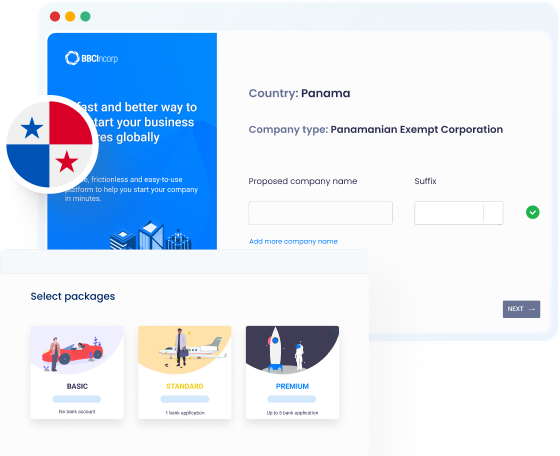Offshore Company Formation Solutions for International Growth
Offshore Company Formation Solutions for International Growth
Blog Article
Navigating the Globe of International Organization: Insights on Offshore Company Formation
Offshore Company Formation presents a critical method for global organization procedures. It uses significant advantages, such as tax optimization and boosted privacy. However, the procedure is not without its challenges. Recognizing the complexities of regulative requirements and different territories is essential. As companies take into consideration these options, the steps included can significantly affect their lasting success. What are the vital variables that can result in reliable offshore administration?
Comprehending Offshore Business: Definition and Purpose
Offshore firms have ended up being a prime focus in global company conversations because of their unique legal and monetary frameworks. These entities are established in territories outside of the owner's nation of home, frequently with beneficial regulative settings. Usually, overseas companies serve different purposes, such as asset protection, tax optimization, and boosted privacy. They can operate in numerous sectors including money, innovation, and trade, supplying versatility for international operations.The specifying characteristic of an overseas Company is its ability to conduct business internationally while profiting from reduced tax obligations and regulatory worries. This framework charms to investors and business owners seeking to expand their portfolios and manage dangers properly. Furthermore, many overseas jurisdictions offer incentives to bring in foreign investment, leading to a rise in the Formation of these companies. Comprehending the interpretation and function of offshore business is vital for maneuvering via the complexities of international business and funding circulation.
Secret Benefits of Offshore Company Formation
The Formation of an offshore Company provides several compelling benefits that draw in financiers and entrepreneurs alike. One of the primary benefits is tax obligation optimization; lots of jurisdictions provide desirable tax rates or exemptions, enabling organizations to take full advantage of earnings. In addition, overseas firms often enjoy better privacy, as many jurisdictions have stringent privacy laws protecting the identifications of Company owners and shareholders.Another significant advantage is asset protection. Offshore entities can safeguard properties from political instability and financial recessions in the proprietor's home nation. These companies can facilitate international trade, providing very easy accessibility to international markets and simplifying cross-border transactions.The flexibility in business structure additionally appeals to business proprietors, as overseas business can be customized to satisfy particular operational demands. In general, the critical Formation of an overseas Company can bring about enhanced monetary safety and security, operational efficiency, and a durable worldwide presence.

Typical Difficulties in Establishing Offshore Entities
Developing overseas entities presents a number of challenges that services have to browse. Key issues consist of regulative compliance, which can differ significantly across territories, and the effect of social differences on operations. In addition, companies have to consider the costs and threats connected with preserving an offshore existence, which can affect overall feasibility.
Regulatory Conformity Issues
When they seek to establish offshore entities, steering governing compliance concerns presents significant challenges for companies. Each territory has its very own set of regulations and regulations, which can vary commonly and might be challenging to navigate. Companies typically encounter obstacles pertaining to tax conformity, anti-money laundering laws, and reporting demands. In addition, changes in worldwide tax regulations can produce uncertainty, making it crucial for organizations to stay updated on compliance commitments. Failing to stick to these policies can lead to serious charges, consisting of fines and reputational damage. Involving and understanding the legal structure with regional specialists is necessary for successful overseas operations, ensuring that businesses can run within the boundaries of the legislation while enhancing their global approach.
Cultural Distinctions Influence

Cost Considerations and Threats
Steering via the financial landscape of overseas entity Formation provides various cost factors to consider and intrinsic dangers. Preliminary arrangement expenses frequently include lawful charges, registration expenses, and compliance costs, which can collect substantially. Furthermore, recurring upkeep expenditures such as yearly fees and accounting solutions should be factored in. Fluctuating regulatory settings in various territories position risks, possibly leading to lawful complications or unexpected prices. Companies might likewise come across difficulties associated with taxation, financial, and reputational problems, which can impact earnings and operational performance. Subsequently, potential entrepreneurs should carry out detailed due persistance and financial forecasting to minimize these dangers and guarantee sustainable development. Comprehending these expense considerations is vital for effective overseas company endeavors.
Steps to Establish an Offshore Company
Establishing an overseas Company includes several crucial steps that call for mindful consideration. Key factors consist of guaranteeing and picking the appropriate territory compliance with regional guidelines, alongside gathering required documents. Comprehending these aspects is essential for an effective overseas service setup.
Picking the Right Territory
Picking the best territory is crucial for anybody seeking to establish up an overseas Company, as it can substantially affect the company's lawful obligations, tax obligation obligations, and operational convenience. Different elements ought to be taken into consideration, including the political stability, regulative setting, and tax obligation motivations offered by potential territories. Popular selections frequently consist of nations with positive tax regimes, such as the British Virgin Islands or Cayman Islands, due to their reduced or no tax rates. In addition, the convenience of doing company and the credibility of the territory can affect capitalist self-confidence and market accessibility. Inevitably, a knowledgeable decision based upon extensive research will assure the overseas Company is positioned for long-term success and conformity with international criteria.
Needed Paperwork and Conformity
When establishing up an offshore Company, understanding the required paperwork and compliance requirements is necessary to guarantee a smooth procedure. Trick files normally consist of a certificate of unification, a memorandum and articles of organization, and evidence of identity for directors and investors. Some jurisdictions might need added details, such as business plans or financial institution references. Conformity with regional regulations is vital, which typically includes appointing a registered representative and maintaining a registered workplace. Regular coverage and adherence to tax obligation responsibilities need to also be taken into consideration. Failure to adhere to these demands can lead to fines or perhaps dissolution of the Company. Complete preparation and examination with lawful experts can aid browse these complexities successfully.
Picking the Right Territory for Your Offshore Company
How can one figure out one of the most appropriate jurisdiction for an overseas Company? Picking the ideal jurisdiction needs careful consideration of several elements. The legal and tax atmosphere plays an important role; territories with favorable tax obligation routines may enhance business profitability. Additionally, the political stability and financial climate of a location can click here affect lasting company viability.Another important aspect is the availability of economic solutions and banking framework, which promote smooth operations. Potential business owners need to additionally think about the convenience of doing service, including the rate of enrollment and the clearness of regulations.Furthermore, language barriers and cultural distinctions can impact operations; therefore, lining up with a territory that straightens with service objectives and personal comfort is vital. Inevitably, comprehensive research and specialist guidance can guide entrepreneurs in making an educated decision that aligns with their tactical objectives.
Conformity and Governing Factors To Consider

Best Practices for Managing an Offshore Organization
Taking care of an offshore business needs strategic preparation and thorough implementation to maximize efficiency and alleviate threats. First, developing a robust conformity structure is necessary to navigate varying laws across jurisdictions. Routine audits and danger analyses aid determine prospective vulnerabilities.Moreover, leveraging regional know-how with collaborations with local experts can boost functional effectiveness and cultural understanding. Making use of innovation, such as cloud-based management systems, improves interaction and information management, making it possible for much better decision-making. Additionally, keeping transparent financial documents and guaranteeing prompt tax filings are important to copyright the Company's honesty. Purchasing staff training and advancement cultivates an experienced labor force, advertising technology and adaptability.Finally, establishing clear performance metrics and vital efficiency signs (KPIs) assists examine organization progress and inform critical adjustments. By adhering to these finest techniques, business can properly manage their overseas operations, making certain long-term success and sustainability in a competitive global marketplace.
Frequently Asked Concerns
What Is the Cost of Creating an Offshore Company?
The cost of developing an offshore Company varies widely depending upon territory, lawful needs, and solutions needed. Commonly, expenditures can range from a couple of hundred to numerous thousand bucks, consisting of enrollment, compliance, and yearly fees.
The length of time Does It Take to Establish an Offshore Entity?
The time required to develop an offshore entity varies significantly, usually varying from a couple of days to a number of weeks (offshore company formation). Elements affecting this period include territory, required documents, and the performance of the company entailed
Can People Form Offshore Companies Without an Organization Companion?
People can indeed create overseas firms without a service partner. Many jurisdictions permit single-member entities, encouraging entrepreneurs to establish and handle their services separately, while still profiting from possible tax advantages and lawful securities.
Are There Any Tax Benefits for Foreign Investors?

What Type of Businesses Frequently Use Offshore Business?
Offshore business are frequently utilized by different fields, including innovation, money, and ecommerce. These entities often offer objectives such as property defense, tax optimization, and personal privacy, interesting both international companies and individual business owners. Offshore business have come to be a focal point in worldwide company discussions due to their unique legal and monetary structures. They can operate in numerous markets consisting of financing, trade, and innovation, giving adaptability for global operations.The defining feature of an offshore Company is its capability to carry out company worldwide while profiting from minimized tax responsibilities and regulative worries. Additionally, offshore companies usually take pleasure in higher privacy, as numerous territories have rigid privacy regulations securing the identities of Company owners and shareholders.Another substantial advantage is asset protection. These business can assist in global profession, providing simple access to worldwide markets and streamlining cross-border transactions.The flexibility in corporate framework also charms to service proprietors, as offshore firms can be customized to fulfill specific operational needs. Selecting the ideal jurisdiction is crucial for any person looking to establish up an overseas Company, as it can greatly impact the company's legal responsibilities, tax responsibilities, and functional convenience.
Report this page